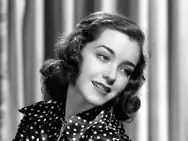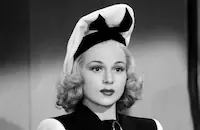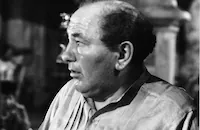I'll Wait for You

Brief Synopsis
Cast & Crew
Robert B. Sinclair
Robert Sterling
Marsha Hunt
Virginia Weidler
Paul Kelly
Fay Holden
Film Details
Technical Specs

Synopsis
"Lucky" Wilson, a smooth, amoral front man working for New York gangster Tony Berolli, gets everything he wants, from the best tables at nightclubs to the most glamourous showgirls. When Berolli thinks that nightclub owner Cassell is complaining that business is bad to avoid giving Berolli his full take, Lucky goes to the club's laundry and proves that Cassell is lying by counting the number of napkins the club has washed. When Lucky threatens him, Cassell decides to go to the police. Lieutenant McFarley and Sergeant Brent, who have been after Lucky and Berolli for some time, go to arrest Lucky, but he slips away from them and drives off. As he is escaping, Lucky is wounded by Brent, but is able to drive as far as Connecticut before he passes out. He is found by the family of farmer Miller, whose wife and daughters believe Lucky's fanciful story that he is fleeing from New York gangsters. He asks them to call for his personal physician, Dr. Anderson, who works for Berolli, and Anderson tells him that Berolli wants him to stay out of sight for a while. Although he is cynical about the boring life of a farm family, Lucky becomes attracted to the Miller's older daughter Pauline and soon finds himself befriending their tomboyish younger daughter Lizzie as well. When Mr. Miller complains about gangsters who are requiring local farmers to pay protection money in order to get their crops to market, Lucky begins to feel ashamed of his life. A short time later, Lucky is almost well when Berolli calls to tell him to change his hideout. Lucky is planning to leave, but when he learns that Mr. and Mrs. Miller will be traveling to visit a relative the next day, he determines to spend the day alone with Pauline. He bribes Lizzie to go with her parents by giving her money to buy a parrot she wants, then spends the morning doing chores with Pauline. They later go on a picnic and when a sudden rainstorm starts, they take refuge in the empty cottage of a neighbor. There Lucky realizes that he is in love with Pauline and cannot take advantage of her. When they return home, McFarley and Brent, who have learned Lucky's whereabouts, are waiting for him. He promises to go along willingly with them if they will pretend to be business associates. Although McFarley is reluctant, when he meets the kindly Millers and sees how they feel about Lucky, he goes along with the story. During dinner, the policemen say that Lucky has to go away for a while and must leave with them for New York. McFarley lets Lucky say a private goodbye to Pauline, and after she promises to wait for him, he tells her the truth. She is stunned by his confession, but as he, McFarley and Brent are about to drive away, she runs after him and again promises to wait for his return. As Lucky leaves, he knows that he will he soon come back home to his family.

Director

Robert B. Sinclair
Cast

Robert Sterling

Marsha Hunt

Virginia Weidler

Paul Kelly

Fay Holden

Henry Travers

Don Costello

Carol Hughes
Reed Hadley
Ben Weldon
Theodor Von Eltz
Leon Belasco
Mitchell Lewis

Joe Yule
Eddie Hart
Jerry Jerome
Steve Darrell
William Tannen

Veda Ann Borg

Ann Morriss
Ann Mason
Mickey Martin

Patricia Dane
Marjorie Deane
George Sorel

Charles Judels
Marek Windheim
Jac George
Crew
Joseph Boyle
Ralph Freed
Cedric Gibbons
Mauri Grashin
Kalloch
Bronislau Kaper
Edwin Knopf
Harry Mcafee
Douglas Shearer
Al Siegel
Guy Trosper
Elmo Veron
Sidney Wagner
Edwin B. Willis

Film Details
Technical Specs

Articles
I'll Wait for You
by Glenn Erickson

I'll Wait for You
Quotes
Trivia
Notes
The working title of this film was Man from the City. According to news items in Hollywood Reporter, backgrounds for the film were shot prior to principal photography, commencing on March 4, 1941. Another Hollywood Reporter news item noted that actress Veda Ann Borg was released from her Monogram Pictures contract just prior to the start of this film and was subsequently put under contract to M-G-M. M-G-M made an earlier version of Mauri Grashin's original story in 1934. That film, entitled Hide-out, co-starred Robert Montgomery and Maureen O'Sullivan, and was directed by W. S. Van Dyke from a screenplay by Frances Goodrich and Albert Hackett (see AFI Catalog of Feature Films, 1931-40 F3.1904).















